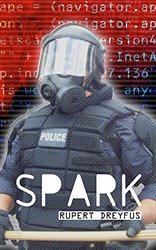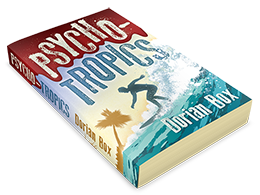Transgressive fiction writer Rupert Dreyfus, from England, made two strong new fans in the U.S. recently as both I and Dorian Box (author of Psycho-Tropics) read his debut novel, Spark. Full of dark humor, insane plot twists, and quirky characters—just the kind of stuff we both love.
Here’s Box’s review of the book:
Disaffected Jake Miller is a self-proclaimed “bumbler” working in a boring job at England’s largest bank, a corporate world he despises. (As an American, I picture a young John Cusack.) If his life were a song, he tells a mysterious woman named Sky, it would be “I Started Something I Couldn’t Finish” by the Smiths. Well, that’s about to change big-time.
Actually, it already has. Jake has been shot by a British counter-terrorism unit. Readers don’t know why as Jake begins unraveling the chaotic chain of events leading to his demise in this thrilling transgressive novel.
 Jake does have one skill. He’s a decent computer hacker. Even better–or maybe worse as it turns out–he’s friends with a world-class hacker named Alfie who lives in a sleazy underworld of internet cafes and disposable computers. A cast of vividly drawn characters, including love object Sky and a gun-wielding, drug-consuming scam artist reminiscent of American writer Hunter S. Thompson, combine to leave Jake with a broken heart, shattered spirit, and really pissed off. His solution? Collapse the global economy, of course.
Jake does have one skill. He’s a decent computer hacker. Even better–or maybe worse as it turns out–he’s friends with a world-class hacker named Alfie who lives in a sleazy underworld of internet cafes and disposable computers. A cast of vividly drawn characters, including love object Sky and a gun-wielding, drug-consuming scam artist reminiscent of American writer Hunter S. Thompson, combine to leave Jake with a broken heart, shattered spirit, and really pissed off. His solution? Collapse the global economy, of course.
Using a direct first person voice, author Dreyfus keeps the plot moving at a fast pace, spicing it up at every turn with dark humor and genuine insights into human nature. “The world is such a beautiful place when your heart begins to yearn,” he observes before everything falls apart. While hilarious throughout (we’re talking laugh-out-loud hilarious), the book is also disturbing because the “Spark” that Jake unleashes on civilization rings all too possible in our current state of shaky world affairs.
An excellent book with an off-kilter worldview that is fresh and frighteningly funny.
I concur. We’re both looking forward to reading Dreyfus’s new short story collection, The Rebel’s Sketchbook. I had the chance to “sit down” (virtual-style) with Dreyfus this week to gain some insights into Spark, his inspirations, whether his work is art imitating life (specifically, his), and the nature of transgressive fiction:
Every author has his story about what sparked his idea for a novel (pardon the pun). How and when did you come up with the idea for Spark?
Watching the London riots of 2011 is where everything begins with Spark. It basically put the UK on lockdown for a few days. I remember watching the unfolding events on live news channels and I couldn’t believe what I was seeing. What really struck me is how so many people had decided to express themselves in such violent ways. I also found it curious that the media wasn’t engaging with them; they were just portraying rioters as thugs, thieves and vandals. I suppose I wanted to fill in the blanks so I decided to take one of the disaffected masses who, through the internet, focuses their frustration with the world and becomes a mouthpiece for the marginalised and downtrodden.
Your main character, Jake, knows his way around computers, and even refers to himself as a computer nerd. Do you share Jake’s passion and computer knowledge?
I’m actually fairly average when it comes to using computers. However, my interest in them is really just how much of an impact they are having. If you’re old enough to remember the days before dial up you’ll no doubt be aware that our lives have drastically changed since the internet became mainstream. A large part of what I try to do is capture both the positives and the negatives because to ignore it seems like a missed opportunity from a storytelling perspective. And while I’m not capable of hacking my way out of a paper bag, I love Anonymous. Someday I want to write a short story collection based solely on computer hackers. The possibilities for this would be endless.
Jake is sort of an odd soul; he seems to have a good heart, but then some of his actions beg to differ. How would you describe Jake in your own words?
I think you’re largely spot on. He’s supposed to represent a disaffected, slightly idiotic person whose heart is ultimately in the right place. He hasn’t got a clue what’s going on in the real world, but he knows from his own day-to-day experiences that the corporate world just doesn’t suit him or people in general. For Jake life sucks so the natural progression for him is to do something about it.
But he’s also incredibly lonely which is like an epidemic in London. There was an opinion poll commissioned by the BBC a couple of years ago which showed that about a quarter of people in London feel lonely. This is remarkable when you think just how many people are crammed into one tiny space and yet they struggle to make any friends.
As nerdy an oddball as Jake is, Vinnie Sloane makes him look like the poster boy for normality. I have to ask, how did you come up with the idea for Vinnie? Was he modeled after someone in particular?
I knew that in order to make Spark a more interesting read, I needed to have a funny housemate dynamic because they were going to be central to the plot. Visually Vinnie is based on a poor man’s Kurt Cobain (which is why Jake says something about him living in the shadow of a rock star). The conspiracy theory aspect was actually inspired by one of my good friends who believes in this type of stuff. We’ll sit for hours debating it and I find it to be a fascinating worldview. I know that my friend reads my stories so it’s a bit of a good natured dig at him really. However, I’d like to put it on record that it’s not supposed to be a dig at conspiracy theorists in general; I’m just ribbing a good friend. On my three mile long list of potential targets; conspiracy theorists don’t appear on it once.
Your writing style is loaded with dark humor, sarcasm, and satire; some of the descriptions and analogies you use in your books are absolutely hilarious. How do you come up with this stuff?
I suppose I’ve always had a dark, cynical imagination and with age it’s just getting worse. As for the actual stories; I get the basic premises from all over the place. It’s really abstract how they can come about. For example Hatchet Job was inspired by my younger brother’s addiction to playing Call of Duty online with his friends. I thought it’d be fun to write a story about someone becoming thoroughly addicted to video games to the point where they lose touch with reality. This type of thing is also portrayed in Spark. There’s a character called Craptash who plays those crazy online role playing games where you pretend to be an orc and you take out a mortgage on a treehouse, and then you have to locate gold coins in a dragon’s nest to keep up with the repayments. You really have to suspend belief in order to appreciate it. So it’s mostly just observation and then putting these things under a dark humorous lens.
As for analogies, similes and whatnot: whenever they’re required I just try to be as creative as I can and hope that they amuse people as much as they amuse me.
Who would you say is your main influence as a writer? Are there any authors whose styles you would compare your writing style to?
As predictable as it is I’d say that my main influence is George Orwell. I love the effortlessness of his writing and the fact that he wrote with a distinctive social conscience. As for comparing my writing style to other authors: I suppose it has a lot in common with all the transgressive authors. The style is very simplistic and conversational, and always in the first-person.
Your writing in Spark reflects a somewhat-less-than-satisfied view of world conventions. Is that just fiction or are you truly a rebel at heart? Is that what “transgressive fiction” is all about? How would you define it for readers not familiar with it?
I’m a rebel for sure. On one level I can’t agree with anyone when it comes to political issues, but I think people would be surprised at how relaxed I am in real life. I have a couple of friends who think Nigel Farage speaks the Gospel and I don’t rush to fall out with them over it—however much I disagree with them. I just feel compelled to mouth off about the failings of our leaders and aspects of society which get us all down.
As for your second and third question: transgressive fiction has a long history, but the contemporary stuff was mostly born out of the beat movement. What gets called transgressive fiction these days will often use narrators who are caught up in bizarre predicaments and will often go to peculiar places which don’t get written about so much (hence the word ‘transgress’).
For anyone not familiar with the genre, I’d say that it’s almost like an allergic reaction to the constraints of commercial fiction and, to a lesser degree, literary fiction. Both of these can be fantastic, but they can sometimes place an expectation on what a story should be. Transgressive fiction rebels against this and allows writers to take a different approach altogether; both in style and content. There’s also often a rawer representation of themes such as addiction issues, crime, social anxiety etc.
In a nutshell I’d say that it offers readers an alternative. A bit like a good punk record or a hip hop record or some other type of music which goes against the grain.
Check out Dreyfus’s books on Amazon.UK here and Amazon.US here.



